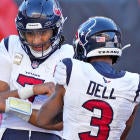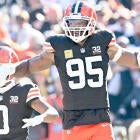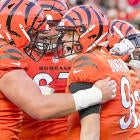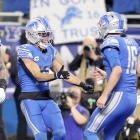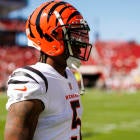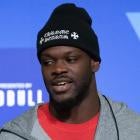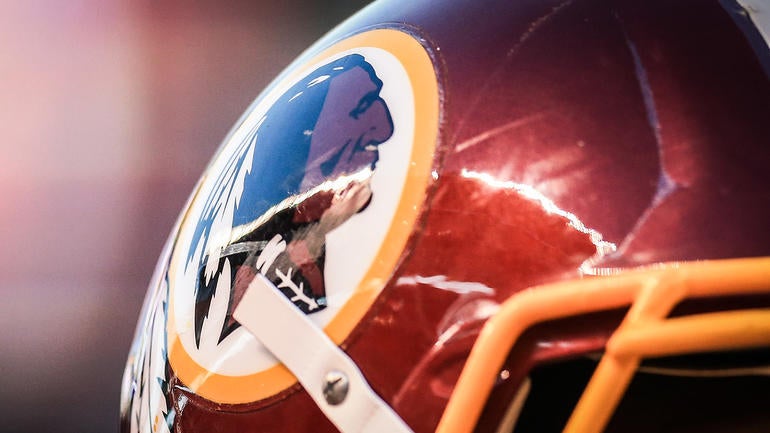
The Washington franchise has been under scrutiny for decades because of the team nickname, along with the meaning and interpretation of the word. The franchise had the team name since 1933, one year after the organization was formed as the Boston Braves in 1932.
The debate around the team name finally reached its tipping point as the franchise officially announced Monday the team name will be retired. The name has generated controversy for years, but it wasn't until this month that a change actually appeared to be a possibility.
Here is a timeline detailing the origin and controversy behind the name:
1933: The Boston Braves become the Boston Redskins after owner George Preston Marshall, who told reporters he didn't want the name to be confused with the Boston Braves -- the "other" Boston team in Major League Baseball that played in the city until 1953.
1937: The Redskins move to Washington after Marshall was unhappy with the fan support in Boston. He actually moved the league championship game against Green Bay to the Polo Grounds in New York from Boston, a game his team lost. The team name, obviously, did not change.
1967: The U.S. Patent and Trademark Office grants a formal trademark to the team name, and it has been renewed several times since.
1971: The first controversy over the Washington's team name arises as it is called a slur against Indigenous Americans by critics. The name was compared to other racist slurs of African Americans, as Washington journalists provided extensive coverage of the team nickname and why it was offensive.
1972: The current logo script of "Redskins" debuts, which remains to this day. The script is modeled after the likeness of the buffalo nickel. Team president Edward Bennett Williams says the name was meant to "convey and not disrespect -- but reverence for the Indian" when the first activists asked the franchise to change the name.
1992: The name controversy re-emerges at Super Bowl XXVI, when the team played the Buffalo Bills in Minnesota. Around 3,000 demonstrators protested the name. Later that year, a group of Native American leaders filed a petition to strip the team of its name registrations.
1999: The Federal Trademark Trial and Appeal Board rules in Suzan Shown Harjo's favor, citing the team name is disparaging to Native Americans. Harjo, the daughter of Cheyenne and Hodulgee Muscogee parents and a longtime advocate for Native American rights, filed the lawsuit seven years earlier. The team successfully appeals in federal court.
2009: Harjo loses her appeal after the court "ultimately decides that the law's protections did not apply in her case and that the suit was filed too late. Native Americans have said the trademark should never have been granted in the first place," per CNN.
2013: Redskins owner Daniel Snyder vows the team won't change the name. "We'll never change the name," Snyder said in an interview with USA Today. "It's that simple. NEVER -- you can use caps." Snyder's comments came after the National Museum of the American Indian hosted a symposium on racial stereotypes in American sports which included asking the team to revisit a name change.
Snyder states the name was chosen in 1933 to honor Native Americans in general and the coach and four players at that time who were Native American; and that former head coach George Allen consulted with the Red Cloud Indian Fund on the Pine Ridge Indian Reservation when designing the current logo. The Red Cloud Indian Fund sent a letter to the Washington Post stating "Red Cloud Indian School has never -- and will never -- endorse the use of the name 'Redskins.' Like many Native American organizations across the country, members of our staff and extended community find the name offensive."
President Barack Obama weighs in on the controversy in 2013 as well, saying, "If I were the owner of the team and I knew that the name of my team, even if they've had a storied history, that was offending a sizable group of people, I'd think about changing it."
2014: General manager Bruce Allen states the name was originated by Native Americans to refer to themselves, while again claiming the logo was also designed and approved by Native American leaders, adding the vast majority of both Native Americans do not find the name offensive. The letter was sent to then Senate Majority Leader Harry Reid.
The team also released a YouTube video regarding the team name, titled "Redskins is a Powerful Name" where several Native Americans address their support for the team.
2018: Following Major League Baseball's Cleveland Indians removing Chief Wahoo from the team's uniforms and stadium, NFL commissioner Roger Goodell states Washington's team name and logo would remain. Goodell doubled down from his 2013 statement that cited origins and tradition as a reason for keeping the team name.
2020: The team removes George Preston Marshall's statue from outside RFK Stadium and removes his name from all official team material. The team also removes Marshall's name from the lower bowl at FedEx Field and decides to honor Bobby Mitchell, the franchise's first Black player, by retiring his number and renaming the bowl after him.
- June: Nike and FedEx are among a group of corporations (PepsiCo was also included) whose investors requested that they end their relationships with Washington unless the team changes its name. FedEx CEO Fredrick Smith is a part owner of the team.
- July 3: Washington announces "the team will undergo a thorough review of the team's name. This review formalizes the initial discussions the team has been having with the league in recent weeks."
- July 13: Washington announced it has formally retired the "Redskins" nickname and logo. A new nickname and logo will be announced at a later date.
"Today, we are announcing that we will be retiring the Redskins name and logo upon completion of this review," Washington said in a statement released Monday morning. "Dan Snyder and Coach [Ron] Rivera are working closely to develop a new name and design approach that will enhance the standing of our proud, tradition rich franchise and inspire our sponsors, fans and community for the next 100 years."














